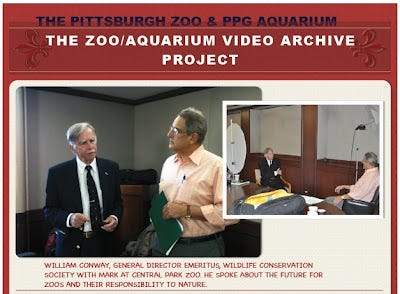The Zoo/Aquarium Video Archive Project
An Interview with Industry Pioneers
By Jordan Schaul | National Geographic | August 29, 2013
Emmy Award-winning producer and writer Loretta Caravette teamed up with Curator Emeritus Mark Rosenthal of the Lincoln Park Zoo and Dr. Barbara Baker, CEO of the Pittsburgh Zoo and Aquarium, to chronicle the history of zoos and aquariums through an unprecedented collection of interviews with North America’s most distinguished zoo and aquarium directors. The video also highlights the current state of the industry and the future of ex situ conservation.
The Zoo & Aquarium Video Archive project provides insightful perspectives from the likes of Dr. William Conway, General Director Emeritus of the Bronx Zoo-based Wildlife Conservation Society, and Bill Braker, Director Emeritus of the Shedd Aquarium and the first biologist and degree-holding employee of the renowned aquarium facility.
I was graciously offered an early viewing of the video project, which has been in production since 2008.
As a career zoo and aquarium professional watching the interviews I found myself hanging on to every word uttered by these pioneers of an industry that caters to 180 million visitors a year.
Zoos and aquariums are more than just popular living collections and cultural attractions. These natural history institutions are leaders in conservation and natural science and provide vital formal and informal learning opportunities for young people. The project will undoubtedly serve as a valuable contribution to the conservation science community and will be of benefit to future generations held responsible as stewards of nature and global sustainability.
The archive will be housed at the Pittsburgh Zoo and Aquarium under the auspices of Dr. Barbara Baker and information will be available on the Zoo’s website in the near future.
ABOUT NATIONAL GEOGRAPHIC SOCIETY
The National Geographic Society is a global nonprofit organization that uses the power of science, exploration, education and storytelling to illuminate and protect the wonder of our world. Since 1888, National Geographic has pushed the boundaries of exploration, investing in bold people and transformative ideas, providing more than 14,000 grants for work across all seven continents, reaching 3 million students each year through education offerings, and engaging audiences around the globe through signature experiences, stories and content. To learn more, visit www.nationalgeographic.org or follow us on Instagram, Twitter and Facebook.
MEET THE AUTHOR
Jordan Carlton SchaulWith training in wildlife ecology, conservation medicine, and comparative psychology, Dr. Schaul's contributions to Nat Geo Voices have covered a range of environmental and social topics. He draws particular attention to the plight of imperiled species highlighting issues at the juncture or nexus of sorta situ wildlife conservation and applied animal welfare. Sorta situ conservation practices are comprised of scientific management and stewardship of animal populations ex situ (in captivity / 'in human care') and in situ (free-ranging / 'in nature'). He also has a background in behavior management and training of companion animals and captive wildlife and conservation marketing and digital publicity. Jordan has shared interviews with colleagues and public figures, as well as editorial news content. In addition, he has posted narratives describing his own work, which include the following examples: • Restoration of wood bison to the Interior of Alaska (As Animal Curator at Alaska Wildlife Conservation Center and courtesy professor at the University of Alaska) • Rehabilitation of orphaned sloth bears exploited for tourists in South Asia (As executive consultant 'in-residence' at the Agra Bear Rescue Center managed by Wildlife SOS) • Censusing small wild cat (e.g. ocelot and margay) populations in the montane cloud forests of Costa Rica for popular publications with 'The Cat Whisperer' Mieshelle Nagelschneider • Evaluating the impact of ecotourism on marine mammal population stability and welfare off the coast of Mexico's Sea of Cortez (With Boston University's marine science program) Jordan was a director on boards of non-profit wildlife conservation organizations serving nations in Africa, North and South America and Southeast Asia. He is also a consultant to a human-wildlife conflict mitigation organization in the Pacific Northwest. Following animal curatorships in Alaska and California, he served as a charter board member of a zoo advocacy and outreach organization and later as its executive director. Jordan was a member of the Communication and Education Commission of the International Union for the Conservation of Nature (CEC-IUCN) and the Bear Specialist Group of the IUCN Species Survival Commission (BSG-SSC-IUCN). He has served on the advisory council of the National Wildlife Humane Society and in service to the Bear Taxon Advisory Group of the Association of Zoos and Aquariums (AZA Bear TAG). In addition, he was an ex officio member of the council of the International Association for Bear Research and Management.




